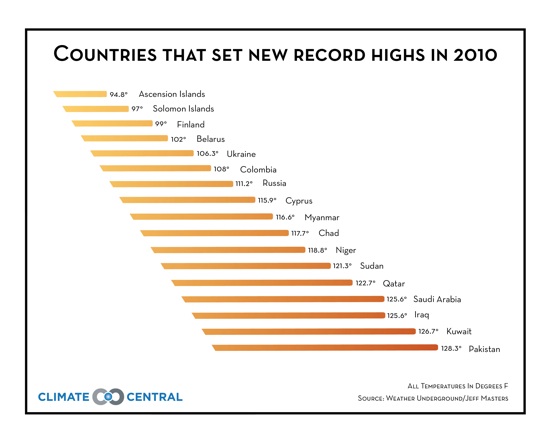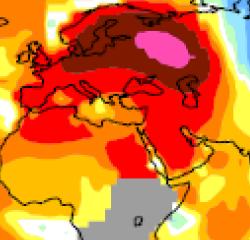This post also appears at Climate Central, a content partner of Climate Watch.
California’s freakishly cool summer has been bucking a global trend this season. You’ve seen the headlines from Moscow and Pakistan–but that’s just part of the story. 2010 has featured several extreme heat events, as well as record flooding, in many countries worldwide. The number of countries that have set new national records for the warmest temperature recorded — 17 — would beat the old record of 14, provided that all of the new records are verified by meteorological agencies. According to meteorologist Jeff Masters of the private weather forecasting firm Weather Underground in Ann Arbor, Michigan, the countries that have set new records thus far this year comprise about 19 percent of the earth’s surface area.
 This graphic shows the new record-high temperatures for the 17 nations that have broken their national records so far in 2010. If verified, the record set in Pakistan would also stand as the warmest temperature ever recorded in the continent of Asia. Click on the graphic for a larger version. (Graphic: Russell Freedman).
This graphic shows the new record-high temperatures for the 17 nations that have broken their national records so far in 2010. If verified, the record set in Pakistan would also stand as the warmest temperature ever recorded in the continent of Asia. Click on the graphic for a larger version. (Graphic: Russell Freedman).
Masters wrote on his blog: “This is the largest area of Earth’s surface to experience all-time record high temperatures in any single year in the historical record. Looking back at the past decade, which was the hottest decade in the historical record, 75 countries set extreme hottest temperature records (33% of all countries.) For comparison, fifteen countries set extreme coldest temperature records over the past ten years (six percent of all countries).” According to Masters, Guinea, which is located in northwestern Africa, is the one nation so far this year to break its coldest temperature record, which occurred in early January.
The new record high temperature set in Belarus occurred during the Russian heat wave, which is still gripping portions of that country. Although Russia did not set any all-time record high temperatures, Moscow did, breaking 100 degrees Fahrenheit for the first time since records have been kept.
For the planet as a whole, 2010 has been extremely warm, with the June-to-July period ranking as the warmest on record for those two months combined.
Part of the warmth earlier this year may have been due to an El Nino event in the Pacific Ocean, which tends to warm the planet, but that event is no longer taking place. According to scientists, including Climate Central’s Claudia Tebaldi, man-made global warming is likely also playing a role in the record heat. Tebaldi and others have published studies showing that as the planet warms due to increasing concentrations of greenhouse gases, warm temperature extremes become more likely to occur.

